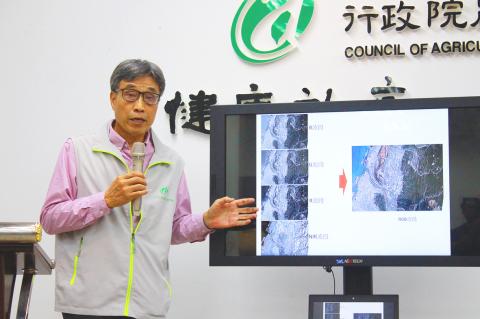The Council of Agriculture last month terminated a contract with a Taiwanese satellite image supplier after finding that its images were sourced from a China-based firm, a council official said yesterday, after local media raised information security concerns.
The council’s Agricultural Research Institute in May opened bidding to purchase hyperspectral satellite images, which are to be used to monitor crop growth and improve supply and demand.
The only Taiwanese firm that tendered a bid won it for NT$9.9 million (US$314,186), the Chinese-language Apple Daily reported yesterday.

Photo: CNA
However, only China’s Zhuhai-1 remote sensing satellite is able to satisfy the institute’s requirements for image resolution better than 10m with more than 30 wavebands, it said.
The images were actually to be supplied by a firm named Orbita Aerospace Science and Technology Co based in China’s Guangdong Province, it said, questioning the government’s resolve to develop its own space technology.
Council Deputy Minister Chen Junne-jih (陳駿季) told a news conference that officials terminated the deal on July 22 after finding it to be problematic.
There would be no penalty for breach of contract, given that it was terminated before the firm started to honor it, he said.
The bidding project aimed to purchase images taken by “commercial” satellites, while image analysis would be carried out by the institute, so there is no risk of leaking secure information, he said.
The Executive Yuan is to publish guidelines for blocking information and communication products that might jeopardize national security, while the council would set up clearer guidelines to prevent similarly controversial deals, Chen said.
Developing hyperspectral cameras for satellites involves high technical thresholds, and only the US and China are known to have the ability, National Space Organization Deputy Director-General Yu Shiann-jen (余憲政) said.
Taiwan still has a long way to go before it can autonomously develop such cameras, but it several years ago developed one for an aircraft, which is currently being tested, Yu added.

A preclearance service to facilitate entry for people traveling to select airports in Japan would be available from Thursday next week to Feb. 25 at Taiwan Taoyuan International Airport, Taoyuan International Airport Corp (TIAC) said on Tuesday. The service was first made available to Taiwanese travelers throughout the winter vacation of 2024 and during the Lunar New Year holiday. In addition to flights to the Japanese cities of Hakodate, Asahikawa, Akita, Sendai, Niigata, Okayama, Takamatsu, Kumamoto and Kagoshima, the service would be available to travelers to Kobe and Oita. The service can be accessed by passengers of 15 flight routes operated by

Alain Robert, known as the "French Spider-Man," praised Alex Honnold as exceptionally well-prepared after the US climber completed a free solo ascent of Taipei 101 yesterday. Robert said Honnold's ascent of the 508m-tall skyscraper in just more than one-and-a-half hours without using safety ropes or equipment was a remarkable achievement. "This is my life," he said in an interview conducted in French, adding that he liked the feeling of being "on the edge of danger." The 63-year-old Frenchman climbed Taipei 101 using ropes in December 2004, taking about four hours to reach the top. On a one-to-10 scale of difficulty, Robert said Taipei 101

Taiwanese and US defense groups are collaborating to introduce deployable, semi-autonomous manufacturing systems for drones and components in a boost to the nation’s supply chain resilience. Taiwan’s G-Tech Optroelectronics Corp subsidiary GTOC and the US’ Aerkomm Inc on Friday announced an agreement with fellow US-based Firestorm Lab to adopt the latter’s xCell, a technology featuring 3D printers fitted in 6.1m container units. The systems enable aerial platforms and parts to be produced in high volumes from dispersed nodes capable of rapid redeployment, to minimize the risk of enemy strikes and to meet field requirements, they said. Firestorm chief technology officer Ian Muceus said

MORE FALL: An investigation into one of Xi’s key cronies, part of a broader ‘anti-corruption’ drive, indicates that he might have a deep distrust in the military, an expert said China’s latest military purge underscores systemic risks in its shift from collective leadership to sole rule under Chinese President Xi Jinping (習近平), and could disrupt its chain of command and military capabilities, a national security official said yesterday. If decisionmaking within the Chinese Communist Party has become “irrational” under one-man rule, the Taiwan Strait and the regional situation must be approached with extreme caution, given unforeseen risks, they added. The anonymous official made the remarks as China’s Central Military Commission Vice Chairman Zhang Youxia (張又俠) and Joint Staff Department Chief of Staff Liu Zhenli (劉振立) were reportedly being investigated for suspected “serious